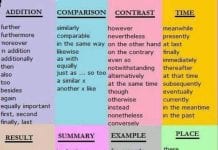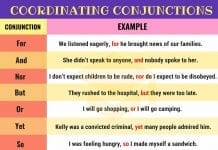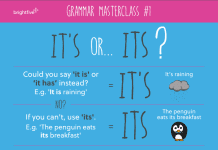When you speak or write in English, you want to make sure that the words and phrases that you use describe exactly what you are thinking. There are many ways to do this, including using qualifiers, modifiers, and intensifiers.
Each of these are ways to make what you describe more specific, so the audience – whether it is your best friend or thousands of your readers on the internet – can better understand what you mean.
What are modifiers?
Like qualifiers, modifiers modify the meaning of a sentence. They change its meaning, depending on the intention of the speaker. Modifiers are the broadest category of words that help you describe meaning.
Because of that, they can be all types of parts of speech, such as adjectives, adjective clauses, adverbs, adverb clauses, absolute phrases, infinitive phrases, participle phrases, and prepositional phrases.
If used well, modifiers can make any sentence more engaging, detailed, and interesting for the reader. Modifiers give the reader more information, creating a more complete picture of the situation.
For example, take this sentence:
- Amy gathered ingredients.
If you use each of these types of modifiers above, you can create something as complex as a story – just with the extra details. For example, see the sentence below:
Young Amy, who just wanted to eat her favorite dessert to reward herself, enthusiastically gathered ingredients for a cake from the kitchen pantry, sneaking bits of sugar and chocolate as she left a trail of flour on the kitchen table and floor, a situation requiring her mother to spend so much time cleaning up that she couldn’t help Amy bake the cake.
The above sentence, though long, tells much more of the story than the first sentence. It is also much more interesting to read, and makes you likely want to know more about the situation.
What did Amy want to reward herself for? Why did her mother not help her gather the ingredients? The sentence also contains at least one of each of the following types of modifiers, as outlined below.
- Adjective (describes a noun or pronoun): young
- Adjective clause (a descriptive phrase that acts as an adjective): who just wanted to eat her favorite dessert
- Infinitive phrase (a descriptive phrase that starts with an infinitive, or to followed by a verb): to reward herself
- Adverb (describes an adjective or verb): enthusiastically
- Prepositional phrase (a descriptive phrase that starts with a preposition, or anything a frog can do to a log, like sit on, in, or on top of it): from the kitchen pantry
- Participle phrase (descriptive phrase starting with a verb in an adjective form, usually ending in –ing or –ed): sneaking bits of sugar and chocolate
- Adverbial clause (a descriptive phrase acting as an adverb): as she left a trail of flour on the kitchen table and floor
- Absolute phrase (a descriptive phrase that attaches to a sentence with no conjunction, often modifying the meaning of the whole sentence): a situation requiring her mother to spend so much time cleaning up that she couldn’t help Amy bake the cake.
As you can see from each of these modifiers above, they can be placed in any part of the sentence to modify any kind of word or phrase.
Adjectives and adverbs always go in front of the word or phrase they are modifying, but other than that, most modifiers can be put where they sound the best and where the thing that they will modify is the clearest.
You have complete flexibility to create your sentences with them!
Skype English Lesson with a native AMERICAN or BRITISH teacher ››
What are qualifiers?
Qualifiers a subgroup of modifiers, and are adverbs, either words or phrases, that change the meaning of a verb by limiting it.
Instead of saying Pam was working, which implies that Pam was doing work, you can limit the amount of work that you describe by saying Pam was hardly working.
This second sentence, with the qualifier hardly, has a completely different meaning than the first. In this case, Pam is doing much less work than before.
The general purpose of a qualifier is to express doubt, or to qualify what you are saying. You limit the meaning of the verbs and adjectives that you change, which can be very useful if you do not yet have a large vocabulary.
Put these qualifiers in front of the verb or adjective that you want to describe.
Some very common qualifiers are in the list below:
To lessen the impact of something:
- May
- Might
- Maybe
- May be
- Might
- Could
- Kind of
- Sort of
- Somewhat
- Slightly
Examples:
- I might be going to Italy in June with my cousins, but I’m not sure yet.
- The rain could fall, but the sun is out to it is hard to predict.
- Katie kind of wants to go to Disneyland, but she is afraid to ask her parents to take her.
To say a smaller number
- Few
- Not many
- A small number
- A minority
- Some
Examples:
- A minority of voters approve of the new legislation that is being considered.
- Few students enjoy learning from reading books, as they would prefer to try different things and learn by experimentation.
- I would like some peas, please.
To say that something does NOT happen more often than it does, or is less common than you expect
- Hardly
- Hardly ever
- Rarely
- Infrequently
- Seldom
- Sporadically
- Scarcely
- For a short time
Examples:
- This is scarcely the time to be doubting our plans, Harry.
- It hardly ever rains here, so if you draw lines in the sand, you can come back and see them years later.
- The ice cream truck rarely comes by our neighborhood, but is very popular when it does.
Skype English Lesson with a native AMERICAN or BRITISH teacher ››
To create doubt
- Unlikely
- Improbable
- Doubtful
- Possibly
- Probably
- Not likely
- Undecidedly
- Apparently
Examples:
- To answer your question, it is highly unlikely that Cassie will be picked for the position.
- Don’t get your hopes up because your design is not likely to be selected.
- The doctor will probably have some time to see you in the afternoon, so come when you are available.
To make generalizations; or talk about multiple things that are related, but not the same
- Basically
- Essentially
- Generally
- Pretty
- Rather
- Virtually
Examples:
- “Traveling in the different countries in Asia is basically the same,” said John, who had never been to any of the countries in Asia.
- Essentially, the point of the festival is to celebrate the great things that have happened in the past year.
- Virtually every tournament only lets boys compete, probably because everyone is afraid to be beaten by a girl.
Qualifiers are not limited to the above list, and can be long phrases as well as single words.
What are intensifiers?
Intensifiers are another special category of modifiers. They have the opposite effect of qualifiers, and strengthen (rather than weaken) the meaning of the words and phrases that they modify.
They are either positive (like very) or negative (like definitely not). Some examples of these two categories of intensifiers are below:
Positive intensifiers
- Very
- Extremely
- Absolutely
- Completely
- Greatly
- Too
- So
- Totally
- Utterly
- Highly
- Rather
- Really
- Exceptionally
- Particularly
- Seriously
- Quite (in American, but not British, English)
- Awfully (be careful: awful means very bad, but awfully usually describes some great, like The cake was awfully delicious!)
Examples:
- The boss was very adamant that the software be changed this way, so we had better listen to his demands.
- I completely agree with Nathan, even though we never agree on anything.
- Sally really wanted to kiss Liam that night.
Negative intensifiers
- Never
- At all
- What on earth…?
- e. What on earth is Mindy doing? To question Mindy’s actions.
- Why… ever…?
- e. Why did I ever agree to help you move your furniture? To indicate regret or a problem.
- Dangerously
- Seriously
- Ever again
- Bitterly (goes with specific words, only, including cold, unhappy, disappointed, sad, )
Examples:
- Luke never wants to see Philip ever again.
- My son does not want to attend this college at all!
- You are getting dangerously close to the edge of my patience.
Skype English Lesson with a native AMERICAN or BRITISH teacher ››
To say a larger number
- Many
- Most
- Some
- Lots of
- Numerous
- Countless
- A majority
- Mostly
- Various
Examples:
- Countless efforts have been made to change the system, but nothing has worked.
- A majority of the benches in this park were donated by people from this neighborhood.
- Herbert was mostly just curious why you designed your office this way.
To say that something happens more often than not, or is more common than you expect
- Often
- Frequently
- Commonly
- For a long time
- Usually
- Sometimes
- Repeatedly
Examples:
- For a long time, I thought that all rabbits just ate carrots all the time.
- She frequently stops by our shop to buy a jar of pickles.
- I have told you repeatedly not to bother me when I am working, have I not?
When and how should you use modifiers, qualifiers, and intensifiers?
For the most part, using these words and phrases can paint a more colorful and vibrant picture of what you are trying to say. They are useful for providing more detail and showing the full picture.
Modifiers can be used anywhere in a sentence and can take many different forms. Qualifiers and intensifiers are words or short phrases that often go in front of the word or phrase they modify.
However, using too many can clutter your writing or speech. One good technique to decrease the number of words you use and the complexity of your sentences is to review your writing.
Can your modifiers, qualifiers, and intensifiers be replaced by words that tell your meaning even better?
For example, you can use difficult or challenging instead of very hard, or a breeze and simply instead of very easy. Using this higher level vocabulary improves your writing by clarifying what you mean, which helps your audience understand you better.
Examples:
- Very important = crucial, central, essential
- Very unimportant = trivial, irrelevant
- Very cold = chilly or freezing
- Very hot = sweltering
- Very confusing = puzzling, perplexing
- Very slow = sluggish
- Very fast = speedy, rapid, swift
- Very large = enormous, giant, huge
- Very small = nonexistent, tiny

























